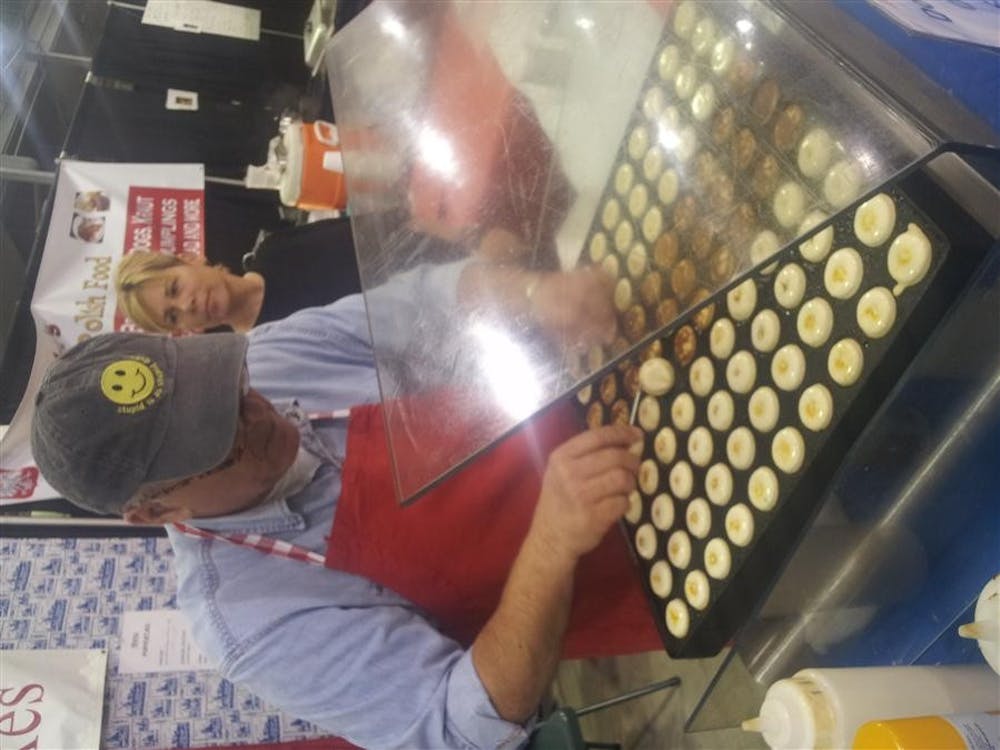I am always reminded of my gratitude for international cuisine during Thanksgiving, when food filling the table captures the essence of the holiday spirit.
Turkey overflowing with carbo-licious stuffing, several servings of side dishes, sauces and sweets are what we first indulge in as we recognize the gifts given to us.
This break, I was reminded of my appreciative attitude for diverse cuisine when I attended the annual Indy International Festival.
This year’s festival was the weekend before Thanksgiving at the Indiana State Fairgrounds, where multiple vendors mingled with festival attendees in a room filled with international flags.
Each display highlighted the most attractive accents of each culture through cuisine, costumes, artistic displays, song and dance.
Going from vendor to vendor, taking in the delicious, authentic smells and watching the efficient workers practice their mastered culinary techniques, I felt I was given another outstanding opportunity to travel the globe all in one place.
Starting in the Caribbean, I made my way through cuisines from Jamaica, the Netherlands, Poland, Italy, Egypt, India and China.
Walking from booth to booth, each vendor was willing to share the sources of their items and explain what role each cuisine played in daily or celebratory culture.
I had the chance to explore culture with my eyes, ears and taste buds.
Trying fried plantain, fresh gelato and lo mein all under one roof left me with plenty of conversations, recipes, stories and new favorites.
This week, I’ll leave you with two of my favorites: a satiating Egyptian stew called Bamia and a sweet and savory Dutch dessert, Poffertijes, or mini pancakes.
A favorite Egyptian stew, Bamia, literally meaning okra, is found in several Middle Eastern countries.
Okra, originally from South Asia and West Africa, can be added to traditional vegetable stews.
Often served with rice as a main dish, Bamia is a remedy for cold weather that has been adapted into different versions in different countries, including Egypt, Saudi Arabia and Iraq.
Heat up one cup of olive oil and add one tablespoon of salt. Add one cup of chopped onion and five cloves of chopped garlic. Add one pound of beef sirloin, cut into cubed pieces. Allow the beef to cook for about five to ten minutes, and set the mixture aside.
Stir two cups of tomato sauce and two tablespoons of tomato paste together with two tablespoons of olive oil and one teaspoon of salt. Add two cups of water, a teaspoon of white pepper and coriander and a tablespoon of cumin. Bring the mixture to a boil, and add two cups of frozen okra. Allow the mixture to simmer until the okra is tender, about 40 minutes. Add the beef and mix on low heat for 10 minutes.
Remove the stew from heat, and add a pinch of salt and hot sauce before serving. This recipe pairs well with basmati rice and salad.
A sweet dessert that left me hungry for more was Dutch Poffertijes, also known as mini pancakes . These are prepared on a special hot iron pan used to craft the mini pancakes into a fluffy, bite-sized serving.
Sold at many Dutch festivals, these treats are often made in large batches. Quickly crafted, the pancakes sit on the pan for only a minute before they are flipped with two small forks and cooked to perfection.
The light pancakes are soft and often described as sponge-like. They can be paired with powdered sugar, sweet syrups or fruit garnish. The baby pancakes are best served when made fresh in a Poffertje pan.
You can buy a small-scale pancake pan and make this delicacy yourself.
Before getting caught up in the long winter and finals, treat yourself to an international recipe for a look at the dishes for which people in other cultures are thankful.
Being thankful for international, diverse dishes

Get stories like this in your inbox
Subscribe





